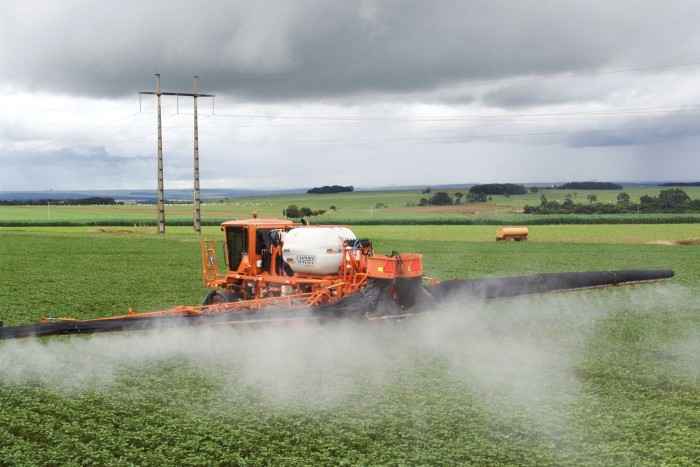[ad_1]
Released into the sugarcane fields by drones, the wasps track their prey with ruthless efficiency. Guided by finely tuned senses, they hunt down the eggs of the sugarcane borer — a moth whose ravenous larvae have long plagued Brazilian farmers — and parasitise them.
When the eggs hatch, instead of the borer’s progeny, more wasps emerge. In short order, the pest population in the sugarcane is obliterated and the wasps begin to die off for want of prey.
It is a macabre spectacle but one that is at the heart of advances in sustainable agriculture and food production in Brazil. By using biological macroorganisms such as the wasps, or microorganisms such as fungus or bacteria, farmers can reduce or even eradicate the use of insecticide chemicals on their fields.
Consumers benefit from more natural produce, while producers save on chemical inputs. The farmlands are maintained in healthy condition and the impact of chemical spraying on local communities is reduced.

“Blanket spraying will soon be a thing of the past. The next thing is no chemicals at all; just using biologicals,†says Kieran Gartlan, managing director of The Yield Lab, a venture capital fund focused on agricultural technology.
“Definitely for fruit and vegetables and items for human consumption — we really shouldn’t really be spraying these things [with chemicals].â€
Bio boom
This growing awareness is reflected in the boom of the biological sector both in Brazil and beyond. Between 2013 and 2018, the use of biological products to control pests and disease grew globally by about 7 per cent a year, reaching a value of $1.3bn, according to research firm AgbioInvestor.
In Brazil — an agricultural powerhouse which recently overtook the US to become the world’s biggest soyabean producer — the sector has grown 20 per cent each year since 2014, according to the Brazilian Association of Biological Control Companies. The growth is most evident in the emergence of scores of start-ups in the sector.
“The last five years have been marked by the proliferation of companies in the biological segment, motivated by the potential demand and farmers’ interest,†says Matheus Almeida, an analyst at Rabobank in São Paulo. “Between 2015 and 2019, more than 40 new companies registered their first bio product.â€
Growing awareness of sustainable food production, farmers’ concerns about excessive chemical use and the increasing cost of chemical crop protection are driving the sector, according to Almeida.
By the end of 2019, there were more than 250 bio control products licensed for use in Brazil, with the rights owned by almost 80 companies.
These developments pose a direct challenge to the traditional dominance of chemical companies, such as Bayer and Syngenta, and to a chemical crop protection market that is estimated to be worth more than $12bn per year.
“The big chemical companies know the writing is on the wall and the model for selling chemicals is changing. So they are now investing [in biologicals]. There is big internal development,†says Gartlan.
Gustavo Hermann, director of the Brazilian operations of Koppert, a Dutch biologicals group, admits that “we are still very small compared with the chemical companies†but points out that the biologicals sector is growing fast, “while chemicals face a stabilised marketâ€.
In addition to advances in the deployment of the macro- and microorganisms themselves, Hermann says new tools for precision agriculture, including drones and monitoring equipment, have spurred the growth and efficacy of the sector.
“Before we had to release the insects by hand. Now we have monitoring stations in the fields and drones to release [the insects]. We can work in a more surgical way.â€
Risk aversion
Within Brazil, however, the sector still faces obstacles to growth. Paramount among these is resistance from farmers in far-flung locations, who are not as technologically savvy and who are typically risk averse with new investments.
“Everybody who is investing in biological controls is enthusiastic about the opportunity. But it is harder for small and medium-sized farms to invest in bio controls. You need the quality control, the technology and the procedures,†says Aurélio Pavinato, chief executive of SLC AgrÃcola, one of Brazil’s biggest producers of soyabeans, corn and cotton.
“And there were some bad experiences in the past. If you have some contamination, it is a problem. If you don’t deploy the application properly, you will lose the yield of the field. It is not easy for everybody to use,†says Pavinato, adding that SLC has spent $2m rolling out the use of biologicals in its farms across Brazil.
Gartlan agrees that Brazilian farmers tend to be “resistant to change because they already deal with a lot of risk and uncertaintyâ€.
But he says there is a snowball effect: as increasing numbers of farmers grasp the potential of biologicals, others will quickly follow suit in order not to be left behind.
“If they see their neighbours are using it and like it, then they will adopt it. If something works for one, it will get around quickly.â€
[ad_2]
Source link







